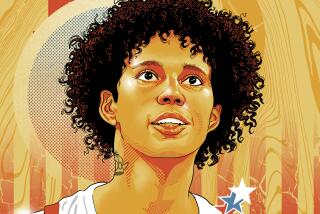Athlete Was Game for Soviet Trip
- Share via
Most high school students are at some point asked to write an essay for English class titled, “What I Did On My Summer Vacation.”
Except Michele Fujioka.
But if Fujioka, a senior at Esperanza High School in Anaheim, were asked to write such a paper, her piece would merit attention.
Part of Fujioka’s summer was spent traveling to the Soviet Union to play basketball with an all-star team of high school players from Northern and Southern California. The team visited three cities--Helsinki, Tallinn and Leningrad--on a 10-day trip sponsored by Amateur Sports Development of the United States.
Fujioka’s first contact with a Soviet citizen took place on the ferry ride across the Baltic Sea from Helsinki to Tallinn, a city in Estonia, a republic that recently declared its independence from the Soviet Union. The man was a wrestler, who was “very friendly but didn’t know a lot of English,” Fujioka said, adding that this was quite common.
“All the students over there have to learn English, so they all try and use it when they meet an American,” she said.
From the time Fujioka and her teammates stepped off the tour bus in their “USA”-emblazoned warm-ups to the time they boarded a jet to head home, they were hounded by people in search of American goods.
In Tallinn, Fujioka said she was approached by young “merchants” selling such items as Soviet military hats and were looking to buy anything American--from Levis to currency.
“There was one guy on the streets who carried around a huge bag of rubles, asking to trade for American dollars,” Fujioka said. “He really gave a great rate.”
Leningrad did not offer the same hospitality, according to Fujioka, who said its citizens “stared at you accusingly.”
“They were real bitter, especially the elderly.”
In one instance, a teammate bumped into a Soviet woman on the street. The woman grew quite angry and drew a crowd. The American girls, Fujioka said, just stood in the middle of a throng of people, not knowing how to calm the enraged woman.
“Our only alternative was to nonchalantly walk away,” she said.
Fujioka said the government’s influence on the everyday life of Soviet citizens was quite noticeable. She said there were “MPs (military police) out on the street, making sure the people know who’s boss.”
Despite these few negative experiences, Fujioka said her trip gave her a true taste for Soviet life, including cigarette smoke. She said the smell of smoke was omnipresent, adding that smoking is “the cool thing to do there. Europeans drink and smoke like you wouldn’t believe.”
Fujioka’s favorite attraction in Leningrad was the Winter Palace, the place of residence for Russian czars of bygone eras. She also enjoyed seeing the “huge cathedrals with awesome architecture” as well as museums and statues of “just about every Russian leader who ever lived,” which are located throughout the city.
Basketball took a back seat to culture on the tour, which was obvious by the way the U.S. team played. Fujioka, a point guard, said the Americans lost all six games they played.
Any excuses?
Well, Fujioka said the Soviets were older, taller, concentrated better and were professionals, meaning they received stipends for their play.
Plus, she said, “we got too lax on the basics. The Soviets have the fundamental skills so fine-tuned, it’s hard to play against them. Still, the emphasis was not on winning but more for the experience. It was sort of like we took a break from touring to play a game.”
James and Barbara Fujioka, Michele’s parents, were chaperones. Barbara Fujioka offered different reasons for the team’s poor play: “Jet lag and no food both make a big difference.”
Several games, practice sessions and an all-day tournaments in Tallinn were canceled because of a lack of facilities--the result of miscommunication, Fujioka said.
However, on the day of the canceled tournament, Fujioka was invited to travel with one of the Soviet teams to spend a day at their sports camp.
“I saw a side of them that I wasn’t used to or expecting,” Fujioka said. “On television and in the movies, I saw Russia as real serious and everyone villain-like, but there I got to see them smile and have fun and act like normal teen-agers.”
She did bring back a few souvenirs--dolls and a porcelain kettle--as well as a definite distaste for her host country’s food.
“The food was just horrible,” Fujioka said. “Oh, man, it’s at least five times worse than cafeteria food.”
Did the basketball defeats also leave her with a bad taste?
“It would have been nice if we could have won a game or two,” she said, “but I’m not really disturbed by it.
“Playing international basketball was a great experience, but the sightseeing, culture and learning experience itself were better than anything else.”
Now, if her English teacher would just ask her to write that essay. . . .
More to Read
Go beyond the scoreboard
Get the latest on L.A.'s teams in the daily Sports Report newsletter.
You may occasionally receive promotional content from the Los Angeles Times.










